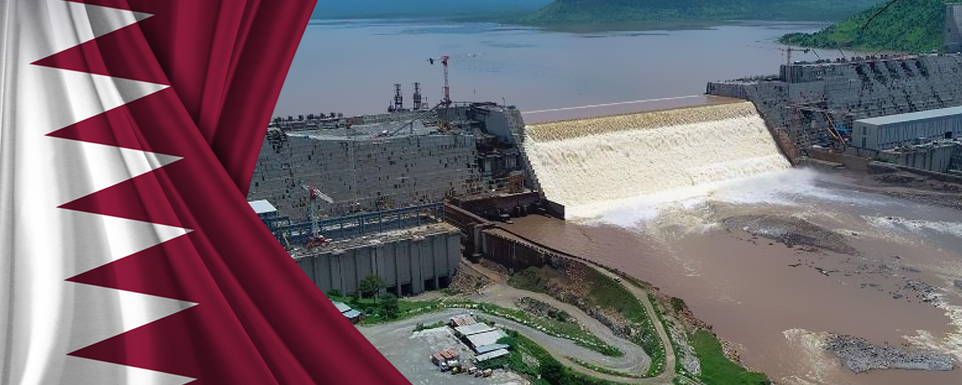The Grand Ethiopian Renaissance Dam (GERD) crisis has been exacerbated by Ethiopia’s rejection of all Egyptian proposals to reach an agreement to settle the crisis. Faced with this crisis, Qatar found itself in front of a mission through which it aspires to end the biggest crisis in Africa. Doha sees this an opportunity to improve its relationship with Egypt, after a break that lasted for years, and as a good gesture from the Gulf country.
Qatar is making unremitting diplomatic and political efforts to reach a solution that satisfies the parties to the crisis represented by Egypt, Sudan, and Ethiopia. It is not surprising that Qatar began with an accelerated pace towards resolving the dispute over the GERD, especially as it has managed to achieve successes in resolving disputes between many international parties, which made it trusted by different countries. Doha has become a haven for those countries looking for international mediation. “Strengthening Qatari relations with Egypt and Sudan” was the title of the two visits by Qatari Deputy Prime Minister and Foreign Minister Sheikh Muhammad bin Abdul Rahman Al Thani to the two capitals Khartoum and Cairo, during May.
However, the rapid moves of the Qatari minister, and what he issued during his meeting in Khartoum with the Sudanese Minister of Foreign Affairs, Maryam Al-Sadiq Al-Mahdi, confirmed that his country would continue to support Sudan in its issues, especially the problems of GERD and border tensions with Ethiopia. In Cairo, the Qatari minister’s talks dealt with discussing the two countries’ positions on the most critical regional issues, including the developments of the Ethiopian Renaissance Dam negotiations.
The Renaissance Dam may be present with the steadfast positions of the State of Qatar, which has supported the Egyptian and Sudanese people in the cause of their water security for many years. The region is awaiting the developments of the Renaissance Dam crisis, especially after announcing the failure of negotiations between the parties to the situation. Still, the two visits by the Minister of Foreign Affairs of Qatar to Egypt and Sudan may predict a move towards ending the tension in this issue.
Upon his return to Doha, the Qatari minister received the Minister of State for Foreign Affairs of Ethiopia, Radwan Hussein, in an unmistakable sign that Qatar may contribute its experience in resolving international and regional conflicts to this issue. This was confirmed by the Ethiopian News Agency, where it revealed that the talks dealt with “the current situation of the Renaissance Dam and the comments raised about it,” relations between Ethiopia and Qatar, as well as regional issues.
Perhaps the Qatari position is stable even before reconciliation between Doha and Cairo (the Gulf crisis). In March 2020, Qatar confirmed, during the Arab League’s statement rejecting any unilateral Ethiopian measures related to the Renaissance Dam. Doha expressed its support for Cairo and any measures it takes in the difficult circumstances it is going through.
Political analyst Qutb Al-Arabi believes that there is Qatari mediation between Ethiopia and Egypt and Sudan, indicating that it is “mediation accepted by all parties, unlike the Emirati mediation that Sudan rejected, and the UAE was forced to withdraw a few days ago.” Al-Arabi talks about Qatar’s international experiences in mediation, saying that “Qatar has great experiences in mediation and regional settlements, and has received international support for this.” He believes that all the parties to whom the Renaissance Dam crisis relates “only need a strawberry leaf that conceals their face and enables them to descend from the top of the tree.” He explains, “Ethiopia is determined to commit to its people’s interests in the second filling on time, but it wants to reduce external pressures.” He noted that “the Egyptian and Sudanese regimes want any achievement – even formally – that they present to their people and amplify it in the media, and this is what the Qatari mediation may do.”
As for the Egyptian political analyst, Yasser Abdel Aziz, he confirms that the GERD’s file was very present during the visit of the Qatari Foreign Minister to Egypt and the visit of the Ethiopian Foreign Minister to Doha, and during the discussions that took place. He indicated that “the GERD issue is the main issue that concerns the Egyptian people.” Abdulaziz said, “The GERD issue is a very urgent matter for the Qataris because Doha is called to work on it seriously, because it presides over the Arab League in its local session, and it is a regional issue that concerns the Arab League, and it is Qatar’s right and duty to work on it.”
In political terms he explained, “The Egyptian regime realised that the Emirati role was not positive, as Abu Dhabi promised more than once to intervene in the dam issue, and is also a partner in it.” He indicated that the matter did not come as the Egyptian regime wanted it to. He indicated that the Egyptian regime needs to penetrate the issue in one way or another. It has the Qatari option, as it could benefit from Qatar’s good relations with Ethiopia, which was reflected during the last two visits.
He pointed out that Qatar has strong relations with the American administration, which began to interact strongly, as the statements of American officials show that it is taking the issue seriously and that it has a strong role to protect the crisis. He pointed out that “Qatar is playing a calming role, and the shuttle visits of the Qatari Foreign Minister to Cairo can be explained by the fact that Doha wants to have a stronger and bigger role in the crisis.”









